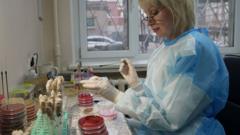The conflict in Ukraine is amplifying an urgent public health challenge as cases of antimicrobial resistance (AMR) surge within hospitals treating war-related injuries. Among those affected is 27-year-old Pte Oleksander Bezverkhny, who lost both legs and has faced severe complications stemming from drug-resistant infections after being evacuated to Feofaniya Hospital in Kyiv. Initially deemed unlikely to survive due to severe abdominal injuries and extensive shrapnel wounds, his condition became critical when medical staff realized that infections he sustained were unresponsive to standard antibiotics.
AMR represents a grave global concern beyond Ukraine's borders. According to statistics, around 1.4 million deaths globally were attributed to AMR infections in 2021, with the UK alone recording over 66,000 serious cases in 2023. The pressures of the ongoing war in Ukraine, however, have hastened the rise of multi-resistant pathogens, most notably in civilian and military medical facilities alike. Dr. Andriy Strokan, deputy chief physician at Feofaniya Hospital, reports that over 80% of the patients admitted are suffering from antibiotic-resistant infections.
Despite diligent efforts by healthcare workers to maintain strict hygiene measures and protocols, hospitals are overwhelmed by the influx of casualties, making effective infection control challenging. Dr. Volodymyr Dubyna, leading the ICU at Mechnikov Hospital in Dnipro, notes that the number of available beds has increased dramatically due to the war-related injuries, while staffing shortages have compounded the problem. With one nurse often required to care for 15 to 20 patients, maintaining stringent hygiene practices is increasingly difficult.
Compounding the issue is the nature of medical transfers in war zones. As soldiers like Pte Bezverkhny move between multiple medical facilities for care, the transfer can facilitate the spread of diverse AMR strains, worsening their conditions. This is starkly different from other conflicts, such as the Afghanistan War, where critical care was managed on-site before evacuation to more stable clinics in Europe.
Ukrainian hospitals are unable to isolate infected patients due to the sheer number of casualties, allowing powerful multi-resistant bacteria to propagate rapidly. The treatment of these infections often requires "reserve" antibiotics, which have a limited supply. Overreliance on such medications can accelerate resistance, presenting another layer of complexity as healthcare providers strive to balance the urgent need to save lives against the risk of developing new resistant strains.
In Bezverkhny's case, overcoming the infection required the use of rare and costly antibiotics, provided through international support efforts. After enduring more than 100 operations and a year in treatment, his life-threatening situation has stabilized, underscoring the ongoing struggle against the rising tide of drug resistance that threatens to compromise future medical interventions. With the patterns of infection worsening, healthcare professionals remain on high alert as they navigate this precarious landscape amidst an unrelenting war.



















